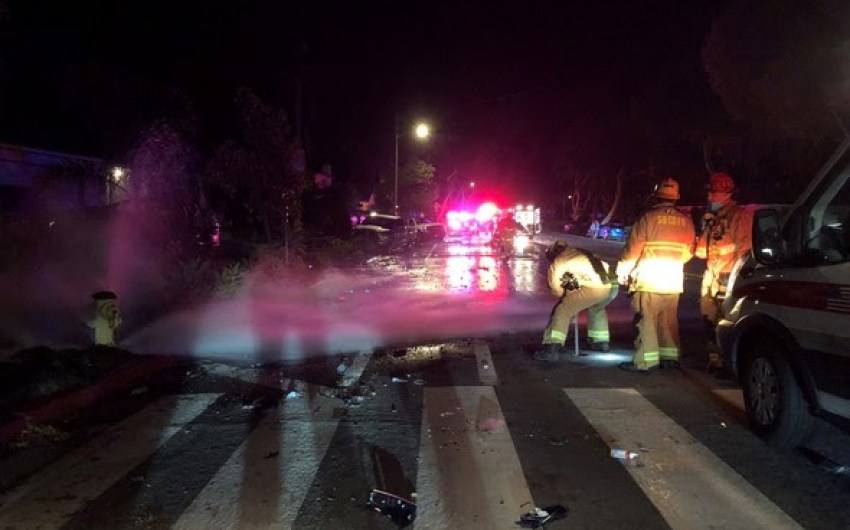In-Custody Death of Jaime Angel Gonzalez, 33, at Santa Barbara County Jail Ruled Accidental
‘Physical Force’ Was Considerable Factor but ‘Reasonable and Lawful,’ DA Concludes

The Santa Barbara District Attorney’s Office determined that the manner of death of Jaime Angel Gonzalez, 33, which occurred on December 28, 2022, while in custody at the Santa Barbara County Northern Branch Jail, was accidental.
A report released on February 14 by the DA’s Office concluded its legal review after an investigation by the Santa Barbara County Sheriff’s Office (SBSO), which oversees jail operations. The Coroner’s Bureau, which is a division of the Sheriff’s Office, found that Gonzalez’s manner of death was accidental, revealing that his cause of death was methamphetamine intoxication. However, they also found significant conditions, including dilated cardiomyopathy, obesity, and physical restraint, were additional factors in his death. While physical force was a considerable factor, the DA’s statement concluded that “physical force used by SBSO staff to restrain Gonzalez prior to his accidental death was reasonable and lawful, and they bear no state criminal liability.”
Officers first responded to the sober living house where Gonzalez was staying in Orcutt after receiving a call over dispatch that Gonzalez requested assistance for a dispute. Sheriff’s deputies responded just before 8 a.m. and reported Gonzalez requested transportation to the local parole office. However, as the interaction with Gonzalez furthered, the deputies “suspected he was under the influence of a controlled substance.”
After Gonzalez admitted to recent drug use, deputies contacted his parole officer, who instructed them to place Gonzalez under arrest and transport him to County Jail. As they attempted to arrest Gonzalez, he fled on foot, causing the deputies to pursue for several blocks before they were able to catch up with him. Eventually with the help of another deputy, they were able to transport Gonzalez to the Northern Branch Jail.
The report includes that Gonzalez had complained of back pain and expressed paranoid concerns throughout the arrest that he was going to be raped or killed. The report indicated deputies considered transporting Gonzalez to a hospital for medical evaluation but decided to take him directly to jail since he was “not showing physical signs of a medical emergency.”
Upon arrival at 8:40 a.m., Gonzalez underwent a medical evaluation by a registered nurse from Wellpath, the jail’s contracted private medical care provider, and was assessed by a clinical social worker who recommended he be placed in a mental-health observation cell. During this time, Gonzalez repeated his concerns of physical harm and complained of back and head pain. Before Gonzalez could be placed in the observation cell, he began physically resisting the custody deputies’ orders by kicking and spitting, the DA’s report states. Eventually, deputies were able to place Gonzalez in a safety cell, designed to prevent self-harm and for inmates’ protection. Within moments, Gonzalez became unresponsive, prompting jail personnel to revive him with a dose of Narcan.
After he was resuscitated, Gonzalez resisted again, flailing and kicking, which caused the jail personnel to attempt to restrain him. At 9:42 a.m., he became unresponsive again and required an additional Narcan dosage, during which time AMR Medical response arrived. At 10 a.m., Gonzalez was transported to Marian Medical Center, where he was pronounced dead shortly thereafter despite medical staff’s attempts to revive him.
The legal analysis conducted by the DA’s Office stated that the cause of death was determined to be an accident, as evidenced by the autopsy reports and investigation. While physical restraint was a factor that contributed to his death, the analysis found “that all the deputies applied reasonable force in a reasonable manner to restrain Gonzalez.”
“Based on our review of the facts and circumstances surrounding Gonzalez’s death the physical restraint employed by SBSO deputies was reasonable and lawful,” concluded the report. “The deputies bear no state criminal legal liability for their actions.” The details of the full report can be found on the District Attorney’s website.
This review comes after Santa Barbara’s 2022-2023 Grand Jury Reports investigated several deaths that occurred in Santa Barbara’s Main and Northern Branch jails. One report, titled “Vicious Cycle,” vehemently condemned the state of mental-health care in county jails; this was exemplified by two deaths in 2022 where two separate inmates deemed incompetent to stand trial (IST), due to their mental incapabilities, were found dead from fentanyl overdoses. Another report, “Every Death in Custody Is a Failure,” recommended that a legal review be conducted into Wellpath, the healthcare provider for the county’s correctional facilities, and its ability to provide mental-health care.
After the reports were released in summer 2023, Sheriff Bill Brown stated he “wholly disagreed” with their assessment. Jonathan Paul Thomas, who died of a heart attack after merely 20 minutes in custody, was a morbidly obese man with a history of serious drug abuse and mental-health illnesses. In its report “A Death in Custody: Lessons Learned,” the 2022-2023 Grand Jury questioned the circumstances under which Thomas died, particularly the restraint he was put under by custody deputies. While the Sheriff’s Office forensic examiner concluded Thomas’s death was accidental — caused by obesity, acute methamphetamine toxicity, and a dangerously enlarged heart — the Grand Jury recommended an independent review and reinvestigation be conducted by the California Attorney General. Sheriff Brown, however, wrote in an official response that their recommendations “would not be implemented because it is not warranted.”
In December 2023, Grand Juror Stan Roden, mental-health advocates, and retired attorney Gail Osherenko (on behalf of the League of Women Voters and Clergy & Laity United for Economic Justice) urged the Board of Supervisors to address the Grand Jury reports, and in particular, the state of mental health care in jails. During that hearing, assistant county executive officer and former chief probation officer Tanja Heitman stated the county agreed there was a “need to improve mental-health care in the jail.”
In concurrence, Sheriff Brown stated that he would be open to “a group of people looking at things related to medical care in the jail, as long as it’s advisory to me as sheriff. I think that’s reasonable. It’s certainly something we can talk about.”
Wellpath’s contract is up for renewal this month.
Premier Events
Sun, Apr 28
6:00 PM
Santa Barbara
AHA! Presents: Sing It Out!
Thu, May 02
5:00 PM
Santa Barbara
Things with Wings at Art & Soul
Sat, May 04
10:00 AM
Lompoc
RocketTown Comic Con 2024
Sat, Apr 27
11:00 AM
Santa Barbara
Santa Barbara Plant Fest
Sat, Apr 27
3:30 PM
Santa Barbara
Santa Barbara Trapeze Co and Unity Shoppe Spring Food Drive
Sat, Apr 27
8:00 PM
Santa Barbara
Beau James Wilding Band Live
Sun, Apr 28
11:00 AM
Santa Barbara
Santa Barbara Earth Day Festival 2024
Wed, May 01
7:30 PM
Santa Barbara
American Theatre Guild Presents “Come From Away”
Thu, May 02
5:00 PM
Santa Barbara
100th Birthday Tribute for James Galanos
Thu, May 02
5:00 PM
Santa Barbara
Meet the Creator of The Caregiver Oracle Deck
Fri, May 03
4:00 PM
Santa Barbara
Santa Barbara Fair+Expo “Double Thrill Double Fun”
Fri, May 03
8:00 PM
Santa barbara
Performance by Marca MP
Sat, May 04
10:00 AM
Solvang
Touch A Truck
Sun, Apr 28 6:00 PM
Santa Barbara
AHA! Presents: Sing It Out!
Thu, May 02 5:00 PM
Santa Barbara
Things with Wings at Art & Soul
Sat, May 04 10:00 AM
Lompoc
RocketTown Comic Con 2024
Sat, Apr 27 11:00 AM
Santa Barbara
Santa Barbara Plant Fest
Sat, Apr 27 3:30 PM
Santa Barbara
Santa Barbara Trapeze Co and Unity Shoppe Spring Food Drive
Sat, Apr 27 8:00 PM
Santa Barbara
Beau James Wilding Band Live
Sun, Apr 28 11:00 AM
Santa Barbara
Santa Barbara Earth Day Festival 2024
Wed, May 01 7:30 PM
Santa Barbara
American Theatre Guild Presents “Come From Away”
Thu, May 02 5:00 PM
Santa Barbara
100th Birthday Tribute for James Galanos
Thu, May 02 5:00 PM
Santa Barbara
Meet the Creator of The Caregiver Oracle Deck
Fri, May 03 4:00 PM
Santa Barbara
Santa Barbara Fair+Expo “Double Thrill Double Fun”
Fri, May 03 8:00 PM
Santa barbara
Performance by Marca MP
Sat, May 04 10:00 AM
Solvang























